初中英语-句子成分及练习课件(32张ppt)
文档属性
| 名称 | 初中英语-句子成分及练习课件(32张ppt) |  | |
| 格式 | zip | ||
| 文件大小 | 657.0KB | ||
| 资源类型 | 教案 | ||
| 版本资源 | 通用版 | ||
| 科目 | 英语 | ||
| 更新时间 | 2021-05-15 16:21:45 | ||
图片预览

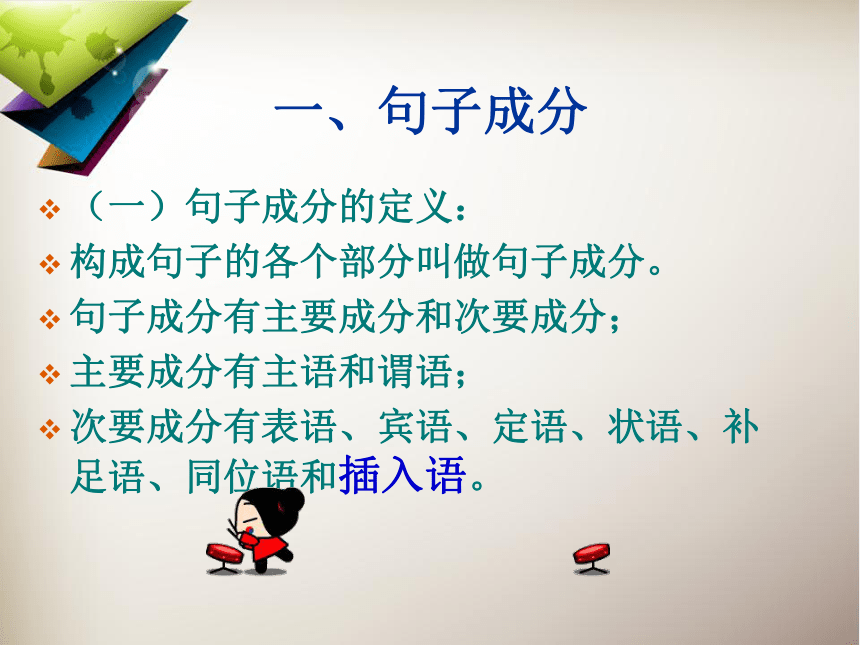
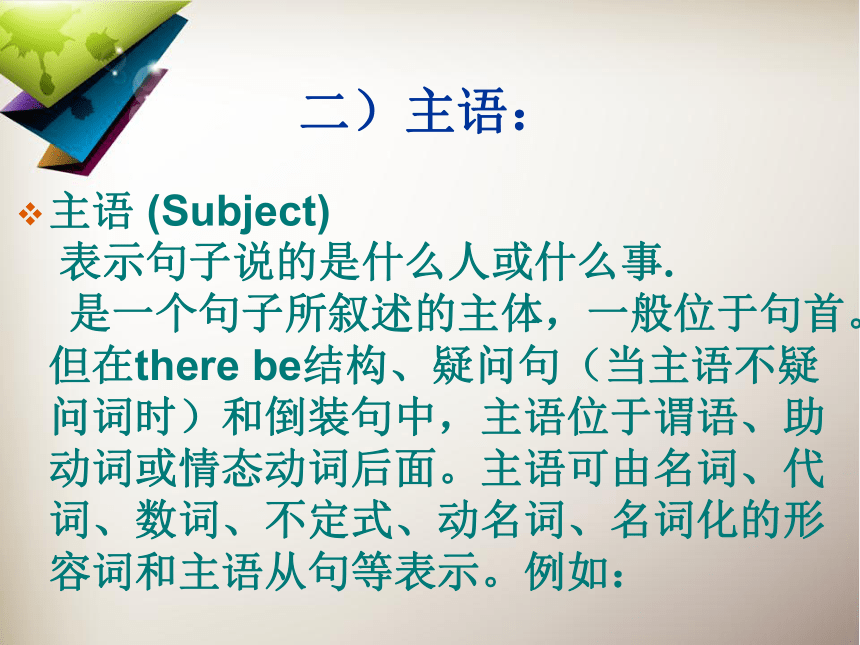

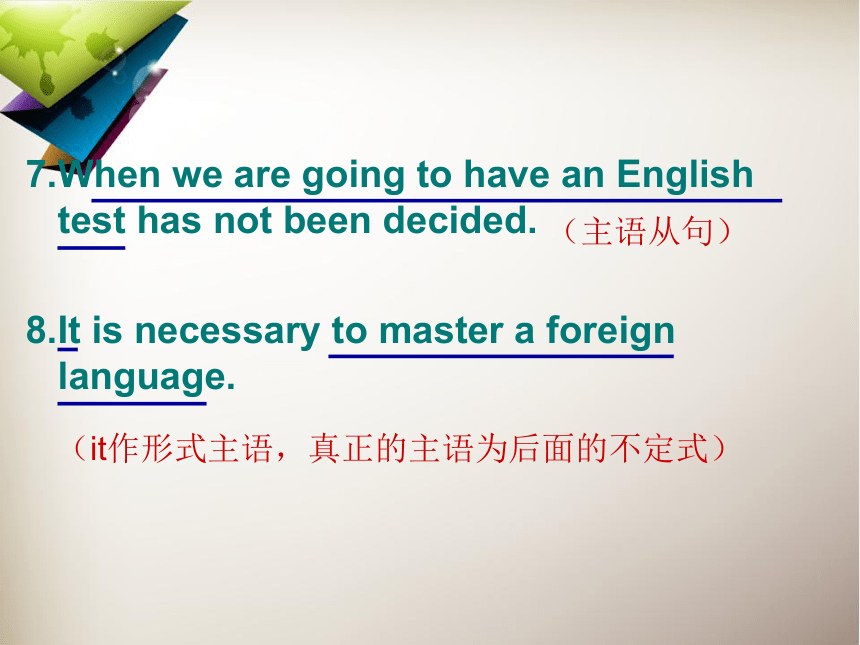
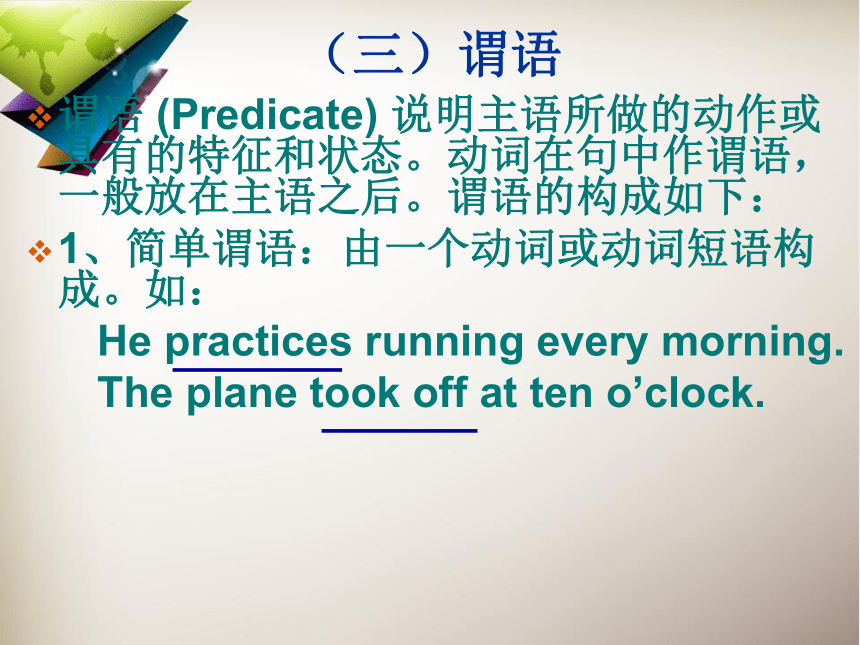
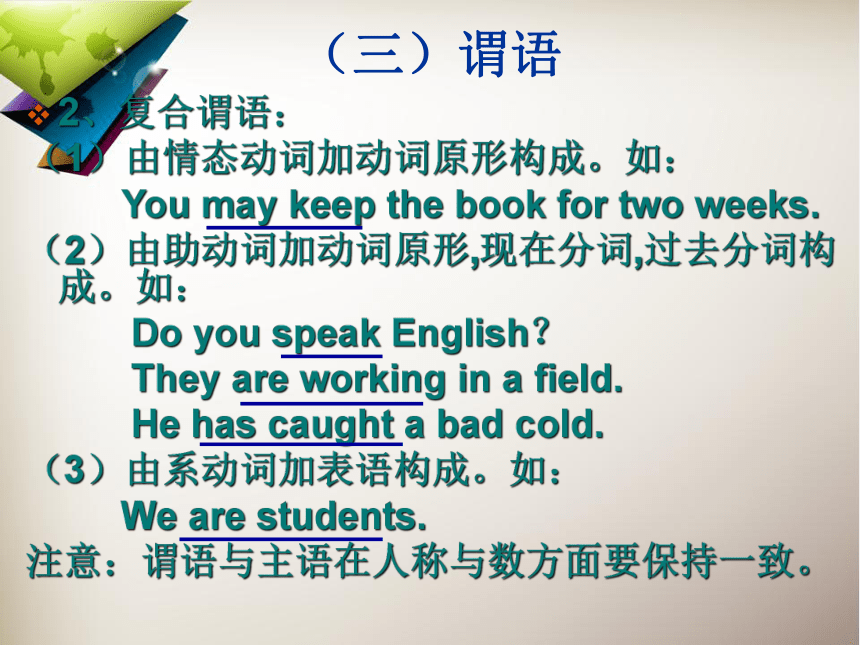
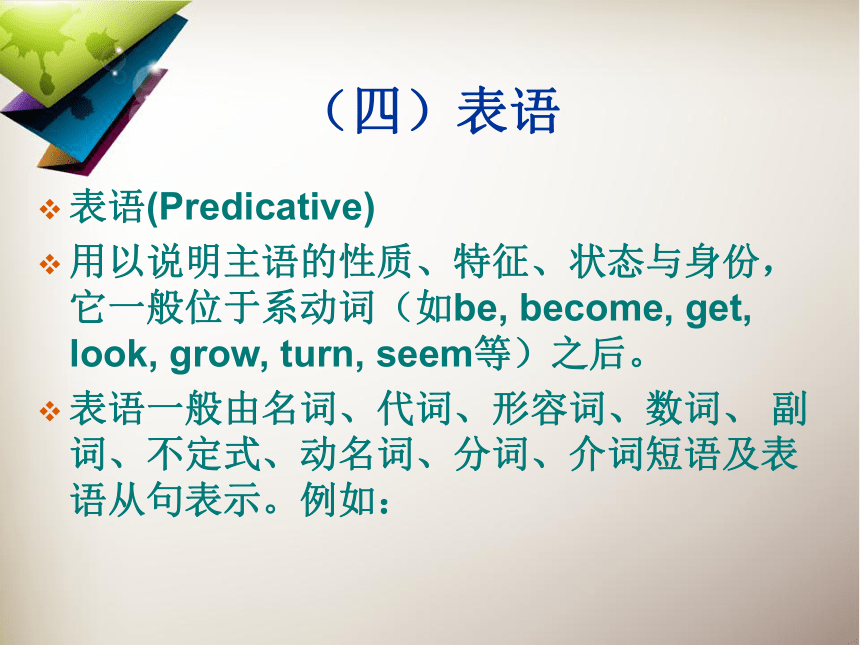
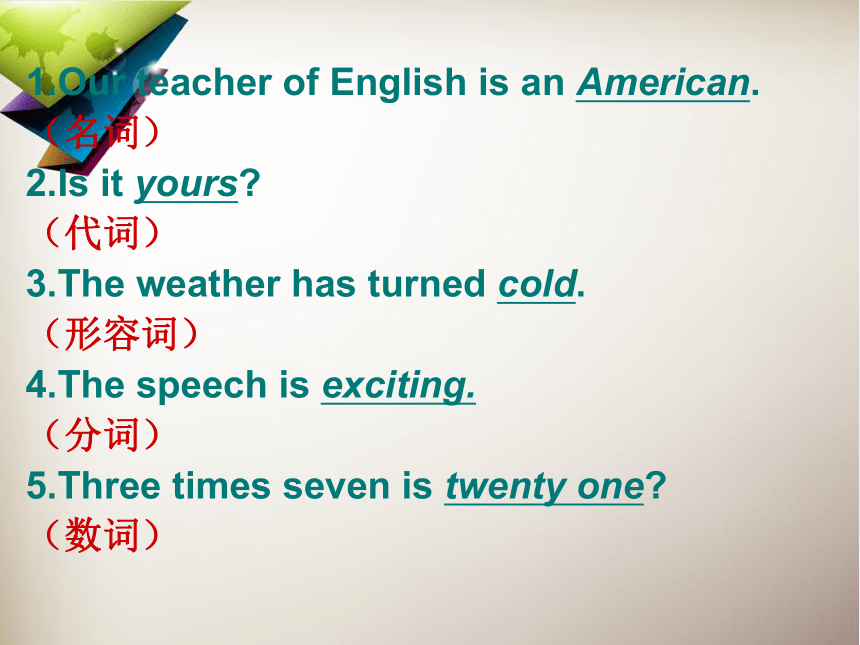
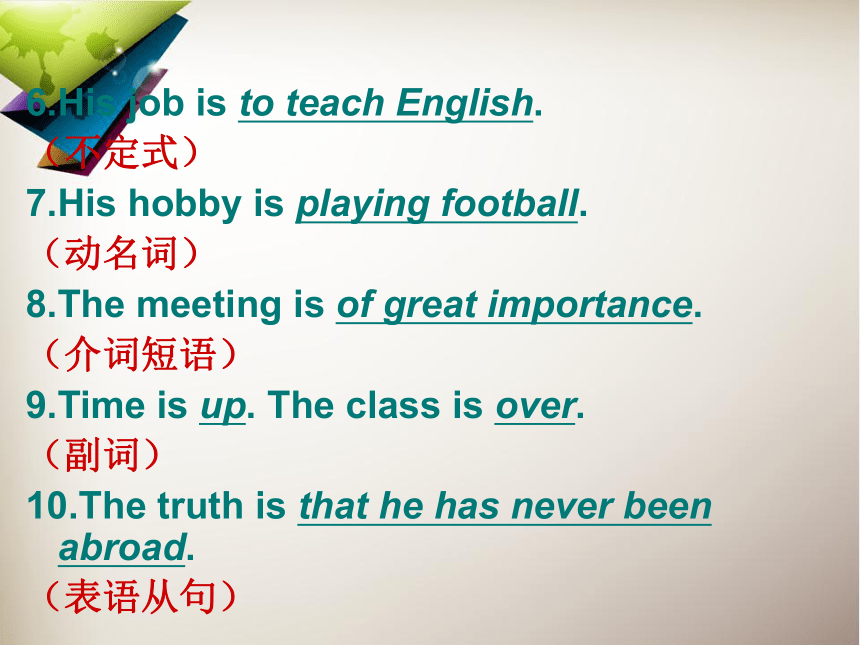
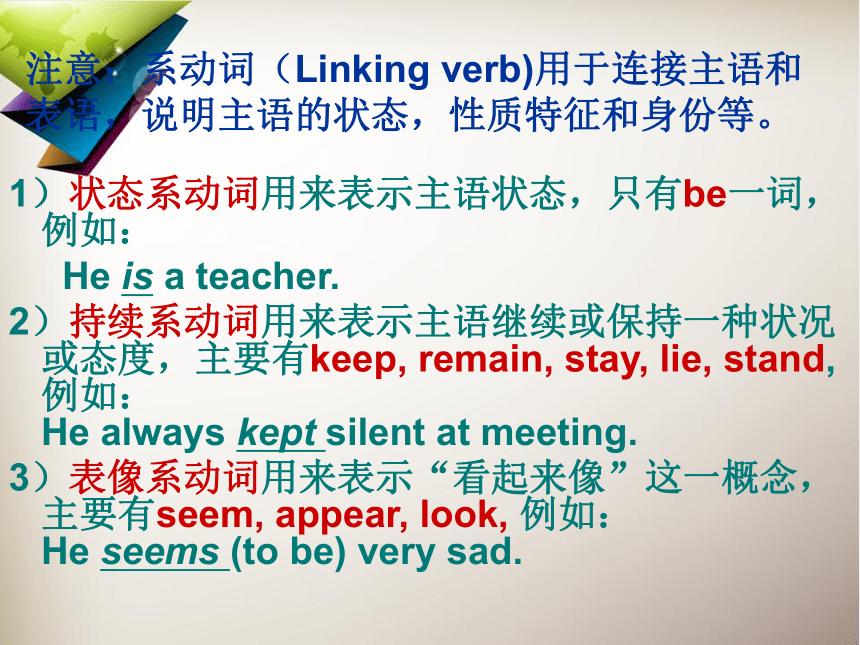

文档简介
(共32张PPT)
句子成分及练习
一、句子成分
(一)句子成分的定义:
构成句子的各个部分叫做句子成分。
句子成分有主要成分和次要成分;
主要成分有主语和谓语;
次要成分有表语、宾语、定语、状语、补足语、同位语和插入语。
二)主语:
主语
(Subject)
表示句子说的是什么人或什么事.
是一个句子所叙述的主体,一般位于句首。但在there
be结构、疑问句(当主语不疑问词时)和倒装句中,主语位于谓语、助动词或情态动词后面。主语可由名词、代词、数词、不定式、动名词、名词化的形容词和主语从句等表示。例如:
1.During
the
1990s,
American
country
music
has
become
more
and
more
popular.
2.We
often
speak
English
in
class.
3.One-third
of
the
students
in
this
class
are
girls.
4.To
swim
in
the
river
is
a
great
pleasure.
5.Smoking
does
harm
to
the
health.
6.The
rich
should
help
the
poor.
(名词)
(代词)
(数词)
(不定式)
(动名词)
(名词化的形容词)
7.When
we
are
going
to
have
an
English
test
has
not
been
decided.
8.It
is
necessary
to
master
a
foreign
language.
(主语从句)
(it作形式主语,真正的主语为后面的不定式)
(三)谓语
谓语
(Predicate)
说明主语所做的动作或具有的特征和状态。动词在句中作谓语,一般放在主语之后。谓语的构成如下:
1、简单谓语:由一个动词或动词短语构成。如:
He
practices
running
every
morning.
The
plane
took
off
at
ten
o’clock.
(三)谓语
2、复合谓语:
(1)由情态动词加动词原形构成。如:
You
may
keep
the
book
for
two
weeks.
(2)由助动词加动词原形,现在分词,过去分词构成。如:
Do
you
speak
English?
They
are
working
in
a
field.
He
has
caught
a
bad
cold.
(3)由系动词加表语构成。如:
We
are
students.
注意:谓语与主语在人称与数方面要保持一致。
(四)表语
表语(Predicative)
用以说明主语的性质、特征、状态与身份,它一般位于系动词(如be,
become,
get,
look,
grow,
turn,
seem等)之后。
表语一般由名词、代词、形容词、数词、
副词、不定式、动名词、分词、介词短语及表语从句表示。例如:
1.Our
teacher
of
English
is
an
American.
(名词)
2.Is
it
yours?
(代词)
3.The
weather
has
turned
cold.
(形容词)
4.The
speech
is
exciting.
(分词)
5.Three
times
seven
is
twenty
one?
(数词)
6.His
job
is
to
teach
English.
(不定式)
7.His
hobby
is
playing
football.
(动名词)
8.The
meeting
is
of
great
importance.
(介词短语)
9.Time
is
up.
The
class
is
over.
(副词)
10.The
truth
is
that
he
has
never
been
abroad.
(表语从句)
注意:系动词(Linking
verb)用于连接主语和表语,说明主语的状态,性质特征和身份等。
1)状态系动词用来表示主语状态,只有be一词,例如:
He
is
a
teacher.
2)持续系动词用来表示主语继续或保持一种状况或态度,主要有keep,
remain,
stay,
lie,
stand,
例如:
He
always
kept
silent
at
meeting.?
3)表像系动词用来表示“看起来像”这一概念,主要有seem,
appear,
look,
例如:
He
seems
(to
be)
very
sad.??
注意:系动词(Linking
verb)用于连接主语和表语,说明主语的状态,性质特征和身份等。
?
4)感官系动词主要有feel,
smell,
sound,
taste,
例如:
This
kind
of
cloth
feels
very
soft.
5)变化系动词表示主语变成什么样,主要有become,
grow,
turn,
fall,
get,
go,
come,
run.例如:
The
river
was
beginning
to
run
dry.
??
6)终止系动词表示主语已终止动作,主要有prove,
turn
out,
表达"结果是;证明是
",之意,例如:
The
rumor
proved
false.
His
plan
turned
out
a
success.??
(五)宾语
宾语(Object)表示动作的对象或承爱者,一般位于及物动词和介词后面。例如:
1.He
is
doing
his
homework.
2.The
heavy
rain
prevented
me
from
coming
to
school
on
time.
3.How
many
dictionaries
do
you
have?
I
have
five.
(名词)
(代词、动名词)
(名词、数词)
4.They
helped
the
old
with
their
housework
yesterday.
5.He
pretended
not
to
see
me.
6.I
enjoy
listening
to
popular
music.
7.I
think(that)he
is
fit
for
his
office.
(名词化形容词,名词)
(不定式短语)
(动名词短语)
(宾语从句)
宾语种类:
(1)双宾语(间接宾语+直接宾语),例如:Lend
me
your
dictionary,
please.
To:
write,
tell,
pass,
give,
send,
promise,
show,
hand,
read,
tell,
bring,
throw等,例如:
He
sent
the
novel
to
William
yesterday.
For:
leave,
buy,
build,
choose,
cook,
draw,
find,
get,
order,
post,
save等,例如:
She
bought
a
gift
for
her
mother.
(2)复合宾语(宾语+宾补),例如:
They
elected
him
their
monitor.
下列动词只能接不定式做宾语
ask,
agree,
care,
choose,
demand,
dare,
decide,
expect,
fail,
help,
hope,
learn,
manage,
offer,
plan,
prepare,
pretend,
promise,
refuse,
want,
wish,
desire等,如:
He
refused
to
lend
me
his
bike.
下列动词只能接动名词做宾语
enjoy,
finish,
imagine,
mind,
practise,
suggest等
下列动词既可接不定式,也可接动名词做宾语,但意义不同,如
try,
remember,
forget,
regret等。
forget
to
do表示“未发生的动作”,forget
doing表示“已完成的动作”。如:
Don't
forget
to
come
here
earlier
tomorrow.(还没来)
I
forgot
returning
the
book
to
him.
(书已还给他了)
(六)宾语补足语
宾语补足语(Object
Complement),用于补充说明宾语的动作,一般位于宾语之后,宾语与宾语补足语一起构成复合宾语。需接复合宾语的动词有:tell,let,help,teach,
ask,see,have,order,make等。“宾补”一般可由名词、形容词、副词、不定式、分词、介词短语和从句充当。例如:
1.His
father
named
him
Xiaoming.
2.They
painted
their
boat
white.
3.Let
the
fresh
air
in.
4.You
mustn’t
force
him
to
lend
his
money
to
you.
5.We
saw
her
entering
the
room.
6.We
found
everything
in
the
lab
in
good
order.
7.We
will
soon
make
our
city
what
your
city
is
now.
(名词)
(形容词)
(副词)
(不定式短语)
(现在分词)
(介词短语)
(从句)
(七)定语
修饰名词或代词的词、短语或从句称为定语(Attribute)。
定语可由以下等成分表示:
1.Guilin
is
a
beautiful
city.(形容词)
2.China
is
a
developing
country;
America
is
a
developed
country.(分词)
3.There
are
thirty
women
teachers
in
our
school.(名词)
4.His
rapid
progress
in
English
made
us
surprised.(代词)
5.Our
monitor
is
always
the
first
to
enter
the
classroom.
(不定式短语)
6.The
teaching
plan
for
next
term
has
been
worked
out.
(动名词)
7.He
is
reading
an
article
about
how
to
learn
English.
(介词短语)
8.She
is
the
girl
who
sings
best
in
my
class.
(定语从句)
(八)状语
修饰动词、形容词、副词或整个句子,说明动作或状态特征的句子成分,叫做状语(Adverbial)。可由以下形式表示
:
1.Light
travels
most
quickly.
2.He
has
lived
in
the
city
for
ten
years.
3.He
is
proud
to
have
passed
the
national
college
entrance
examination.
(副词及副词性词组)
(介词短语)
(不定式短语)
4.He
is
in
the
room
making
a
model
plane.
5.Wait
a
minute.
6.Once
you
begin,
you
must
continue.
(分词短语)
(名词)
(状语从句)
9种状语种类如下:
1.
How
about
meeting
again
at
six?
2.Last
night
she
didn’t
go
to
the
dance
party
because
of
the
rain.
3.I
shall
go
there
if
it
doesn’t
rain.
4.Mr
Smith
lives
on
the
third
floor.
5.She
put
the
eggs
into
the
basket
with
great
care.
(时间状语)
(原因状语)
(条件状语)
(地点状语)
(方式状语)
She
came
in
with
a
dictionary
in
her
hand.
6.In
order
to
catch
up
with
the
others,
I
must
work
harder.
7.He
was
so
tired
that
he
fell
asleep
immediately.
8.She
works
very
hard
though
she
is
old.
9.I
am
taller
than
he
is.
(伴随状语)
(目的状语)
(结果状语)
(让步状语)
(比较状语)
(九)同位语(Appositive)对前面的名词或代词做进一步的解释,通常由名词、数词、代词或从句担任,如:
This
is
Mr.
Zhou,
our
headmaster.
(十)插入语(Parenthesis)对一句话做一些附加的解释,通常有to
be
honest
,
I
think
(suppose,
believe---)等,如:
To
be
frank,
I
don’t
quite
agree
with
you.
句子成分
句子成分
意义
充当词类
例句
主语
表示句子说的是什么人或什么
事
名,代,数,不定
式,动名词,短语或
句子
We
study
in
HuangQiao
Middle
School.
谓语
说明主语做什么,是什么或怎
么样
动词或动词词组
She
is
dancing
under
the
tree.
宾语
表示动作行为的对象
同主语
Both
of
us
like
English.
表语
与联系动词连用,一起构成谓
语,说明主语的性质或特征
同主语
Her
father
is
a
chemist.
His
words
sound
reasonable.
定语
用来修饰名词或代词
形,代,数,名,
副,介词短语或句子
We
have
eight
lessons
every
day.
状语
修饰动词,形容词,副词,表
示动作发生的时间,地点,原
因,目的,方式,结果等
副词,介词短语或句
子
He
works
very
hard.
They
held
a
party
in
Hollywood.
宾语
补足语
逻辑上与宾语是主谓关系
形容词,名词,介词
短语等
She
always
keeps
the
house
clean.
主语谓语是基础,宾表定状补辅助。宾主来自名代数,动词作谓不可无!
选择填空:
(
)1.
____
will
leave
for
Beijing.
A.
Now
there
the
man
B.
The
man
here
now
C.
The
man
who
is
here
now
D.
The
man
is
here
now
(
)
2.
The
weather
____.
A.
wet
and
cold
B.
is
wet
and
cold
C.
not
wet
and
cold
D.
were
wet
and
cold
(
)
3.
The
apple
tasted
____.
A.
sweets
B.
sweetly
C.
nicely
D.
sweet
(
)
4.
He
got
up
____
yesterday
morning.
A.
lately
B.
late
C.
latest
D.
latter
(
)5.
The
actor
______at
the
age
of
70.
A.
dead
B.
died
C.
dyed
D.
dying
(
)6.
____
were
all
very
tired,
but
none
of
____
would
stop
to
take
a
rest.
A.
We,
us
B.
Us,
we
C.
We,
our
D.
We,
we
(
)7.
He
found
the
street
much
______.
A.
crowd
B.
crowding
C.
crowded
D.
crowdedly
(
)
8.I
think
_____necessary
to
learn
English
well.
A.
its
B.
it
C.
that
D.
that
is
(
)
9.
The
dog
____
mad.
A.
looks
B.
is
looked
C.
is
being
looked
D.
was
looked
(
)10.I
will
never
forget
the
day
______
I
joined
the
army.
A.
that
B.
when
C.
in
which
D.
where
句子成分及练习
一、句子成分
(一)句子成分的定义:
构成句子的各个部分叫做句子成分。
句子成分有主要成分和次要成分;
主要成分有主语和谓语;
次要成分有表语、宾语、定语、状语、补足语、同位语和插入语。
二)主语:
主语
(Subject)
表示句子说的是什么人或什么事.
是一个句子所叙述的主体,一般位于句首。但在there
be结构、疑问句(当主语不疑问词时)和倒装句中,主语位于谓语、助动词或情态动词后面。主语可由名词、代词、数词、不定式、动名词、名词化的形容词和主语从句等表示。例如:
1.During
the
1990s,
American
country
music
has
become
more
and
more
popular.
2.We
often
speak
English
in
class.
3.One-third
of
the
students
in
this
class
are
girls.
4.To
swim
in
the
river
is
a
great
pleasure.
5.Smoking
does
harm
to
the
health.
6.The
rich
should
help
the
poor.
(名词)
(代词)
(数词)
(不定式)
(动名词)
(名词化的形容词)
7.When
we
are
going
to
have
an
English
test
has
not
been
decided.
8.It
is
necessary
to
master
a
foreign
language.
(主语从句)
(it作形式主语,真正的主语为后面的不定式)
(三)谓语
谓语
(Predicate)
说明主语所做的动作或具有的特征和状态。动词在句中作谓语,一般放在主语之后。谓语的构成如下:
1、简单谓语:由一个动词或动词短语构成。如:
He
practices
running
every
morning.
The
plane
took
off
at
ten
o’clock.
(三)谓语
2、复合谓语:
(1)由情态动词加动词原形构成。如:
You
may
keep
the
book
for
two
weeks.
(2)由助动词加动词原形,现在分词,过去分词构成。如:
Do
you
speak
English?
They
are
working
in
a
field.
He
has
caught
a
bad
cold.
(3)由系动词加表语构成。如:
We
are
students.
注意:谓语与主语在人称与数方面要保持一致。
(四)表语
表语(Predicative)
用以说明主语的性质、特征、状态与身份,它一般位于系动词(如be,
become,
get,
look,
grow,
turn,
seem等)之后。
表语一般由名词、代词、形容词、数词、
副词、不定式、动名词、分词、介词短语及表语从句表示。例如:
1.Our
teacher
of
English
is
an
American.
(名词)
2.Is
it
yours?
(代词)
3.The
weather
has
turned
cold.
(形容词)
4.The
speech
is
exciting.
(分词)
5.Three
times
seven
is
twenty
one?
(数词)
6.His
job
is
to
teach
English.
(不定式)
7.His
hobby
is
playing
football.
(动名词)
8.The
meeting
is
of
great
importance.
(介词短语)
9.Time
is
up.
The
class
is
over.
(副词)
10.The
truth
is
that
he
has
never
been
abroad.
(表语从句)
注意:系动词(Linking
verb)用于连接主语和表语,说明主语的状态,性质特征和身份等。
1)状态系动词用来表示主语状态,只有be一词,例如:
He
is
a
teacher.
2)持续系动词用来表示主语继续或保持一种状况或态度,主要有keep,
remain,
stay,
lie,
stand,
例如:
He
always
kept
silent
at
meeting.?
3)表像系动词用来表示“看起来像”这一概念,主要有seem,
appear,
look,
例如:
He
seems
(to
be)
very
sad.??
注意:系动词(Linking
verb)用于连接主语和表语,说明主语的状态,性质特征和身份等。
?
4)感官系动词主要有feel,
smell,
sound,
taste,
例如:
This
kind
of
cloth
feels
very
soft.
5)变化系动词表示主语变成什么样,主要有become,
grow,
turn,
fall,
get,
go,
come,
run.例如:
The
river
was
beginning
to
run
dry.
??
6)终止系动词表示主语已终止动作,主要有prove,
turn
out,
表达"结果是;证明是
",之意,例如:
The
rumor
proved
false.
His
plan
turned
out
a
success.??
(五)宾语
宾语(Object)表示动作的对象或承爱者,一般位于及物动词和介词后面。例如:
1.He
is
doing
his
homework.
2.The
heavy
rain
prevented
me
from
coming
to
school
on
time.
3.How
many
dictionaries
do
you
have?
I
have
five.
(名词)
(代词、动名词)
(名词、数词)
4.They
helped
the
old
with
their
housework
yesterday.
5.He
pretended
not
to
see
me.
6.I
enjoy
listening
to
popular
music.
7.I
think(that)he
is
fit
for
his
office.
(名词化形容词,名词)
(不定式短语)
(动名词短语)
(宾语从句)
宾语种类:
(1)双宾语(间接宾语+直接宾语),例如:Lend
me
your
dictionary,
please.
To:
write,
tell,
pass,
give,
send,
promise,
show,
hand,
read,
tell,
bring,
throw等,例如:
He
sent
the
novel
to
William
yesterday.
For:
leave,
buy,
build,
choose,
cook,
draw,
find,
get,
order,
post,
save等,例如:
She
bought
a
gift
for
her
mother.
(2)复合宾语(宾语+宾补),例如:
They
elected
him
their
monitor.
下列动词只能接不定式做宾语
ask,
agree,
care,
choose,
demand,
dare,
decide,
expect,
fail,
help,
hope,
learn,
manage,
offer,
plan,
prepare,
pretend,
promise,
refuse,
want,
wish,
desire等,如:
He
refused
to
lend
me
his
bike.
下列动词只能接动名词做宾语
enjoy,
finish,
imagine,
mind,
practise,
suggest等
下列动词既可接不定式,也可接动名词做宾语,但意义不同,如
try,
remember,
forget,
regret等。
forget
to
do表示“未发生的动作”,forget
doing表示“已完成的动作”。如:
Don't
forget
to
come
here
earlier
tomorrow.(还没来)
I
forgot
returning
the
book
to
him.
(书已还给他了)
(六)宾语补足语
宾语补足语(Object
Complement),用于补充说明宾语的动作,一般位于宾语之后,宾语与宾语补足语一起构成复合宾语。需接复合宾语的动词有:tell,let,help,teach,
ask,see,have,order,make等。“宾补”一般可由名词、形容词、副词、不定式、分词、介词短语和从句充当。例如:
1.His
father
named
him
Xiaoming.
2.They
painted
their
boat
white.
3.Let
the
fresh
air
in.
4.You
mustn’t
force
him
to
lend
his
money
to
you.
5.We
saw
her
entering
the
room.
6.We
found
everything
in
the
lab
in
good
order.
7.We
will
soon
make
our
city
what
your
city
is
now.
(名词)
(形容词)
(副词)
(不定式短语)
(现在分词)
(介词短语)
(从句)
(七)定语
修饰名词或代词的词、短语或从句称为定语(Attribute)。
定语可由以下等成分表示:
1.Guilin
is
a
beautiful
city.(形容词)
2.China
is
a
developing
country;
America
is
a
developed
country.(分词)
3.There
are
thirty
women
teachers
in
our
school.(名词)
4.His
rapid
progress
in
English
made
us
surprised.(代词)
5.Our
monitor
is
always
the
first
to
enter
the
classroom.
(不定式短语)
6.The
teaching
plan
for
next
term
has
been
worked
out.
(动名词)
7.He
is
reading
an
article
about
how
to
learn
English.
(介词短语)
8.She
is
the
girl
who
sings
best
in
my
class.
(定语从句)
(八)状语
修饰动词、形容词、副词或整个句子,说明动作或状态特征的句子成分,叫做状语(Adverbial)。可由以下形式表示
:
1.Light
travels
most
quickly.
2.He
has
lived
in
the
city
for
ten
years.
3.He
is
proud
to
have
passed
the
national
college
entrance
examination.
(副词及副词性词组)
(介词短语)
(不定式短语)
4.He
is
in
the
room
making
a
model
plane.
5.Wait
a
minute.
6.Once
you
begin,
you
must
continue.
(分词短语)
(名词)
(状语从句)
9种状语种类如下:
1.
How
about
meeting
again
at
six?
2.Last
night
she
didn’t
go
to
the
dance
party
because
of
the
rain.
3.I
shall
go
there
if
it
doesn’t
rain.
4.Mr
Smith
lives
on
the
third
floor.
5.She
put
the
eggs
into
the
basket
with
great
care.
(时间状语)
(原因状语)
(条件状语)
(地点状语)
(方式状语)
She
came
in
with
a
dictionary
in
her
hand.
6.In
order
to
catch
up
with
the
others,
I
must
work
harder.
7.He
was
so
tired
that
he
fell
asleep
immediately.
8.She
works
very
hard
though
she
is
old.
9.I
am
taller
than
he
is.
(伴随状语)
(目的状语)
(结果状语)
(让步状语)
(比较状语)
(九)同位语(Appositive)对前面的名词或代词做进一步的解释,通常由名词、数词、代词或从句担任,如:
This
is
Mr.
Zhou,
our
headmaster.
(十)插入语(Parenthesis)对一句话做一些附加的解释,通常有to
be
honest
,
I
think
(suppose,
believe---)等,如:
To
be
frank,
I
don’t
quite
agree
with
you.
句子成分
句子成分
意义
充当词类
例句
主语
表示句子说的是什么人或什么
事
名,代,数,不定
式,动名词,短语或
句子
We
study
in
HuangQiao
Middle
School.
谓语
说明主语做什么,是什么或怎
么样
动词或动词词组
She
is
dancing
under
the
tree.
宾语
表示动作行为的对象
同主语
Both
of
us
like
English.
表语
与联系动词连用,一起构成谓
语,说明主语的性质或特征
同主语
Her
father
is
a
chemist.
His
words
sound
reasonable.
定语
用来修饰名词或代词
形,代,数,名,
副,介词短语或句子
We
have
eight
lessons
every
day.
状语
修饰动词,形容词,副词,表
示动作发生的时间,地点,原
因,目的,方式,结果等
副词,介词短语或句
子
He
works
very
hard.
They
held
a
party
in
Hollywood.
宾语
补足语
逻辑上与宾语是主谓关系
形容词,名词,介词
短语等
She
always
keeps
the
house
clean.
主语谓语是基础,宾表定状补辅助。宾主来自名代数,动词作谓不可无!
选择填空:
(
)1.
____
will
leave
for
Beijing.
A.
Now
there
the
man
B.
The
man
here
now
C.
The
man
who
is
here
now
D.
The
man
is
here
now
(
)
2.
The
weather
____.
A.
wet
and
cold
B.
is
wet
and
cold
C.
not
wet
and
cold
D.
were
wet
and
cold
(
)
3.
The
apple
tasted
____.
A.
sweets
B.
sweetly
C.
nicely
D.
sweet
(
)
4.
He
got
up
____
yesterday
morning.
A.
lately
B.
late
C.
latest
D.
latter
(
)5.
The
actor
______at
the
age
of
70.
A.
dead
B.
died
C.
dyed
D.
dying
(
)6.
____
were
all
very
tired,
but
none
of
____
would
stop
to
take
a
rest.
A.
We,
us
B.
Us,
we
C.
We,
our
D.
We,
we
(
)7.
He
found
the
street
much
______.
A.
crowd
B.
crowding
C.
crowded
D.
crowdedly
(
)
8.I
think
_____necessary
to
learn
English
well.
A.
its
B.
it
C.
that
D.
that
is
(
)
9.
The
dog
____
mad.
A.
looks
B.
is
looked
C.
is
being
looked
D.
was
looked
(
)10.I
will
never
forget
the
day
______
I
joined
the
army.
A.
that
B.
when
C.
in
which
D.
where
同课章节目录
- 词法
- 名词
- 动词和动词短语
- 动词语态
- 动词时态
- 助动词和情态动词
- 非谓语动词
- 冠词
- 代词
- 数词和量词
- 形容词副词及其比较等级
- 介词和介词短语
- 连词和感叹词
- 构词法
- 相似、相近词比较
- 句法
- 陈述句
- 一般疑问句和否定疑问句
- 特殊疑问句及选择疑问句
- 反意疑问句
- 存在句(There be句型)
- 宾语从句
- 定语从句
- 状语从句
- 主谓一致问题
- 简单句
- 并列句
- 复合句
- 主谓一致
- 主、表语从句
- 名词性从句
- 直接引语和间接引语
- 虚拟语气
- 感叹句
- 强调句
- 倒装句
- 祈使句
- 句子的成分
- 句子的分类
- 题型专区
- 单项选择部分
- 易错题
- 完形填空
- 阅读理解
- 词汇练习
- 听说训练
- 句型转换
- 补全对话
- 短文改错
- 翻译
- 书面表达
- 任务型阅读
- 语法填空
- 其他资料
